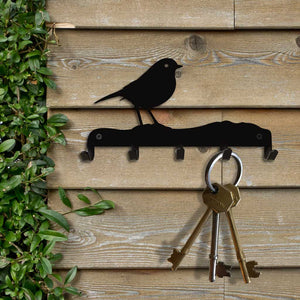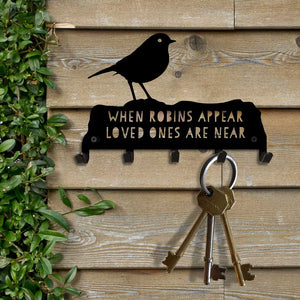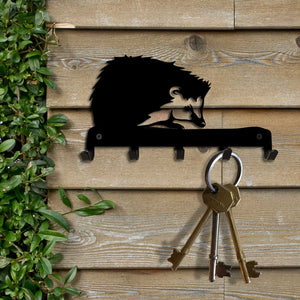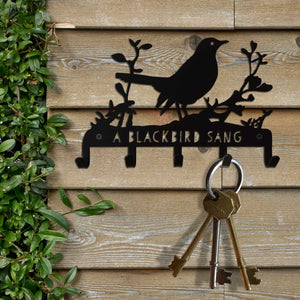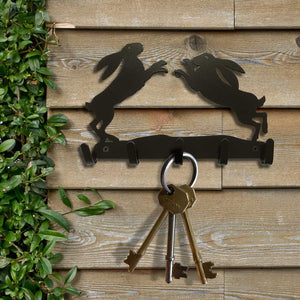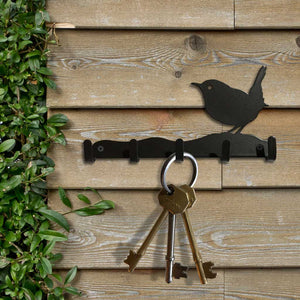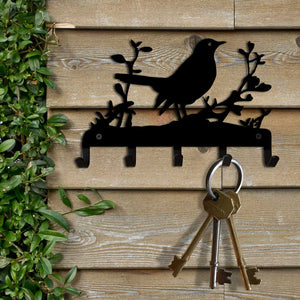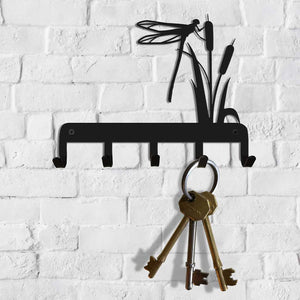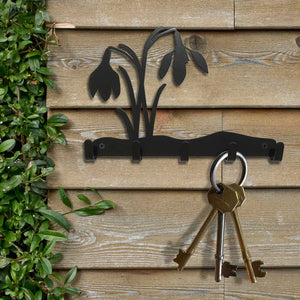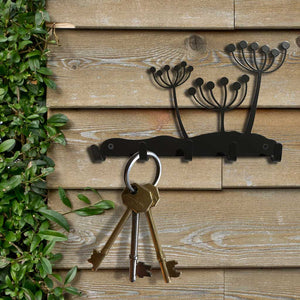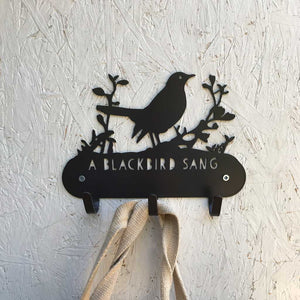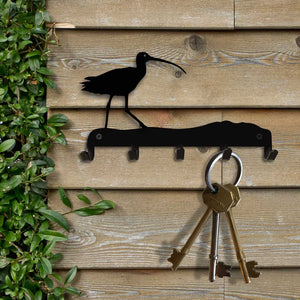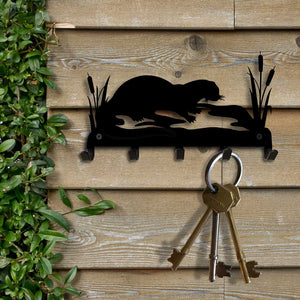{"id":7664728506616,"title":"Key Hooks - Robin redbreast","handle":"copy-of-key-hooks-robin-redbreast","description":"\u003cmeta charset=\"utf-8\"\u003e\u003cmeta charset=\"utf-8\"\u003e\n\u003cp\u003eThe European robin (Erithacus rubecula), known simply as the robin or robin redbreast in the British Isles, is a small insectivorous passerine bird that belongs to the chat subfamily of the Old World flycatcher family. About 12.5–14.0 cm (5.0–5.5 inches) in length, the male and female are similar in colouration, with an orange breast and face lined with grey, brown upper-parts and a whitish belly. \u003cbr data-mce-fragment=\"1\"\u003e\u003cbr data-mce-fragment=\"1\"\u003eThe robin features prominently in British folklore and that of northwestern France, but much less so in other parts of Europe. It was held to be a storm-cloud bird and sacred to Thor, the god of thunder, in Norse mythology. Robins feature in the traditional children's tale Babes in the Wood, the birds cover the dead bodies of the children.\u003cbr data-mce-fragment=\"1\"\u003e\u003cbr data-mce-fragment=\"1\"\u003eMore recently, the robin has become strongly associated with Christmas, taking a starring role on many Christmas cards since the mid-19th century. The robin has appeared on many Christmas postage stamps. An old British folk tale seeks to explain the robin's distinctive breast. Legend has it that when Jesus was dying on the cross, the robin, then simply brown in colour, flew to his side and sang into his ear in order to comfort him in his pain. The blood from his wounds stained the robin's breast, and thereafter all robins got the mark of Christ's blood upon them.\u003cbr data-mce-fragment=\"1\"\u003e\u003cbr data-mce-fragment=\"1\"\u003eAn alternative legend has it that its breast was scorched fetching water for souls in Purgatory. The association with Christmas more probably arises from the fact that postmen in Victorian Britain wore red jackets and were nicknamed \"Robins\"; the robin featured on the Christmas card is an emblem of the postman delivering the card. \u003cbr data-mce-fragment=\"1\"\u003e\u003cbr data-mce-fragment=\"1\"\u003eIn the 1960s, in a vote publicised by The Times, the robin was adopted as the unofficial national bird of the United Kingdom. In 2015, the robin was again voted Britain's national bird in a poll organised by birdwatcher David Lindo, taking 34% of the final vote.\u003c\/p\u003e\n\u003cp\u003ePart of a range of different key hook designs. Each comes with two holes for fixings to a wall. Screws not supplied. \u003c\/p\u003e\n\u003cp\u003eAll dimensions approximate. Illustrations for guidance on main design only. Actual hooks vary in length when bent by hand. Please also note that sometimes the design goes from left to right and vice versa - as we do all this in our studio and we like mixing it up!\u003c\/p\u003e\n\u003cp\u003eSizes:\u003cbr\u003eRobin = 148 x 97 x 0.9 mm\u003cbr\u003e\u003c\/p\u003e\n\u003cp\u003eMaterial: Zinc-coated mild steel, powder coated\u003c\/p\u003e","published_at":"2022-04-14T13:46:37+01:00","created_at":"2022-04-14T11:13:35+01:00","vendor":"A Blackbird Sang","type":"Keyhook","tags":["bereavement","Bird","Birds","Christmas","Faire","Functional","gardener's friend","Hook","Hooks","key hook","Keyhook","Redbreast","Retail","Robin","sympathy","The Secret Garden","Typography","when robins appear","XBLD"],"price":1395,"price_min":1395,"price_max":1395,"available":true,"price_varies":false,"compare_at_price":1295,"compare_at_price_min":1295,"compare_at_price_max":1295,"compare_at_price_varies":false,"variants":[{"id":42735350153464,"title":"Robin","option1":"Robin","option2":null,"option3":null,"sku":"KEYH08","requires_shipping":true,"taxable":true,"featured_image":{"id":37148683174136,"product_id":7664728506616,"position":1,"created_at":"2022-04-14T11:13:37+01:00","updated_at":"2022-04-14T11:13:37+01:00","alt":null,"width":1024,"height":1024,"src":"\/\/ablackbirdsang.com\/cdn\/shop\/products\/abs_keyhooks_robin_1024px_d6070813-e388-45b0-b9e6-9d579e8ef309.jpg?v=1649931217","variant_ids":[42735350153464]},"available":true,"name":"Key Hooks - Robin redbreast - Robin","public_title":"Robin","options":["Robin"],"price":1395,"weight":75,"compare_at_price":1295,"inventory_quantity":36,"inventory_management":"shopify","inventory_policy":"continue","barcode":"5060925561661","featured_media":{"alt":null,"id":29715169575160,"position":1,"preview_image":{"aspect_ratio":1.0,"height":1024,"width":1024,"src":"\/\/ablackbirdsang.com\/cdn\/shop\/products\/abs_keyhooks_robin_1024px_d6070813-e388-45b0-b9e6-9d579e8ef309.jpg?v=1649931217"}},"requires_selling_plan":false,"selling_plan_allocations":[]}],"images":["\/\/ablackbirdsang.com\/cdn\/shop\/products\/abs_keyhooks_robin_1024px_d6070813-e388-45b0-b9e6-9d579e8ef309.jpg?v=1649931217"],"featured_image":"\/\/ablackbirdsang.com\/cdn\/shop\/products\/abs_keyhooks_robin_1024px_d6070813-e388-45b0-b9e6-9d579e8ef309.jpg?v=1649931217","options":["Design"],"media":[{"alt":null,"id":29715169575160,"position":1,"preview_image":{"aspect_ratio":1.0,"height":1024,"width":1024,"src":"\/\/ablackbirdsang.com\/cdn\/shop\/products\/abs_keyhooks_robin_1024px_d6070813-e388-45b0-b9e6-9d579e8ef309.jpg?v=1649931217"},"aspect_ratio":1.0,"height":1024,"media_type":"image","src":"\/\/ablackbirdsang.com\/cdn\/shop\/products\/abs_keyhooks_robin_1024px_d6070813-e388-45b0-b9e6-9d579e8ef309.jpg?v=1649931217","width":1024}],"requires_selling_plan":false,"selling_plan_groups":[],"content":"\u003cmeta charset=\"utf-8\"\u003e\u003cmeta charset=\"utf-8\"\u003e\n\u003cp\u003eThe European robin (Erithacus rubecula), known simply as the robin or robin redbreast in the British Isles, is a small insectivorous passerine bird that belongs to the chat subfamily of the Old World flycatcher family. About 12.5–14.0 cm (5.0–5.5 inches) in length, the male and female are similar in colouration, with an orange breast and face lined with grey, brown upper-parts and a whitish belly. \u003cbr data-mce-fragment=\"1\"\u003e\u003cbr data-mce-fragment=\"1\"\u003eThe robin features prominently in British folklore and that of northwestern France, but much less so in other parts of Europe. It was held to be a storm-cloud bird and sacred to Thor, the god of thunder, in Norse mythology. Robins feature in the traditional children's tale Babes in the Wood, the birds cover the dead bodies of the children.\u003cbr data-mce-fragment=\"1\"\u003e\u003cbr data-mce-fragment=\"1\"\u003eMore recently, the robin has become strongly associated with Christmas, taking a starring role on many Christmas cards since the mid-19th century. The robin has appeared on many Christmas postage stamps. An old British folk tale seeks to explain the robin's distinctive breast. Legend has it that when Jesus was dying on the cross, the robin, then simply brown in colour, flew to his side and sang into his ear in order to comfort him in his pain. The blood from his wounds stained the robin's breast, and thereafter all robins got the mark of Christ's blood upon them.\u003cbr data-mce-fragment=\"1\"\u003e\u003cbr data-mce-fragment=\"1\"\u003eAn alternative legend has it that its breast was scorched fetching water for souls in Purgatory. The association with Christmas more probably arises from the fact that postmen in Victorian Britain wore red jackets and were nicknamed \"Robins\"; the robin featured on the Christmas card is an emblem of the postman delivering the card. \u003cbr data-mce-fragment=\"1\"\u003e\u003cbr data-mce-fragment=\"1\"\u003eIn the 1960s, in a vote publicised by The Times, the robin was adopted as the unofficial national bird of the United Kingdom. In 2015, the robin was again voted Britain's national bird in a poll organised by birdwatcher David Lindo, taking 34% of the final vote.\u003c\/p\u003e\n\u003cp\u003ePart of a range of different key hook designs. Each comes with two holes for fixings to a wall. Screws not supplied. \u003c\/p\u003e\n\u003cp\u003eAll dimensions approximate. Illustrations for guidance on main design only. Actual hooks vary in length when bent by hand. Please also note that sometimes the design goes from left to right and vice versa - as we do all this in our studio and we like mixing it up!\u003c\/p\u003e\n\u003cp\u003eSizes:\u003cbr\u003eRobin = 148 x 97 x 0.9 mm\u003cbr\u003e\u003c\/p\u003e\n\u003cp\u003eMaterial: Zinc-coated mild steel, powder coated\u003c\/p\u003e"}


